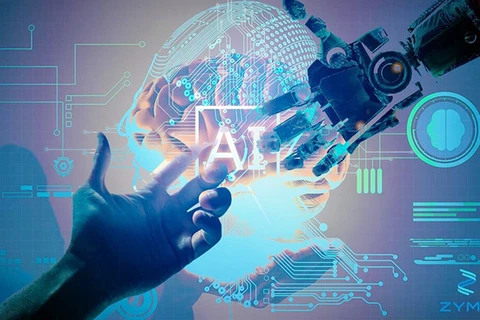 At the launching ceremony of the first AI-integrated computer designed and manufactured in Vietnam. (Photo: VietnamPlus)
At the launching ceremony of the first AI-integrated computer designed and manufactured in Vietnam. (Photo: VietnamPlus) Hanoi (VNA) – The US’s website forbes.com on February 23 published an article highlighting Vietnam’ leading role in the field of AI and the strong development of the AI industry in the country.
The article cited statistics from the Ministry of Information and Communications as saying that the revenue of the information and communication technology (ICT) industry in 2021 was 136.15 million USD, up remarkably from 124.67 million USD in 2020.
The ratio of Vietnam’s value in ICT revenue reached 24.65%, a significant increase compared to previous years.
Vietnam now has more than 64,000 digital technology enterprises, an increase of 5,600 compared to 2020, and nearly 1,000 Vietnamese-branded ICT products and services.
It is estimated that Vietnam has more than 1 million IT workers, and more than 80,000 university and college graduates majoring in information and communication technology. There are 50 universities and academies teaching AI-relating majors in Vietnam.
Forbes highlighted Vietnam’s jump in the AI readiness index when mentioning that the International Development Research Centre in Canada and the UK’s Oxford ranked Vietnam 6th in ASEAN and 62nd in the world for the 2021 Government Artificial Intelligence Readiness Score.
This is the first time Vietnam’s AI Readiness Score reached 51.82 out of 100, which surpasses the global average of 47.72 and helps the country climb 14 places compared to the previous year. The readiness of a country or territory towards AI technology is evaluated through three pillars – the government, technology, and data infrastructure.
OpenGov Asia reported that Vietnam ranked 6th out of 10 ASEAN member countries and 55th in the world in the 2022 Government AI Readiness Index, up seven places compared to 2021. The country earned a score of 53.96, up from 51.82 in 2021, surpassing the global average of 44.61.
According to the article, the Vietnamese government is investing heavily in AI and other digital technologies such as machine learning, blockchain, big data analytics, Internet of Things (IoT), and cloud computing.
Vietnam recently approved the National Digital Transformation Programme until 2025 with a vision to 2030, which creates a foundation for a solid strategy for the country to become a powerful AI innovator in the years to come.
However, besides positive signs for the development of the AI industry, Vietnam still faces challenges, particularly those relating to human resources with the necessary knowledge in AI, the article pointed out.
 The virtual assistant product is integrated into VinFast VF8 smart electric car model. (Photo: VietnamPlus)
The virtual assistant product is integrated into VinFast VF8 smart electric car model. (Photo: VietnamPlus) According to the World Intellectual Property Organisation (WIPO), there are fewer than 2,000 Vietnamese studying and working in AI-related fields, and fewer than 300 are considered as AI experts.
AI will contribute 13 trillion USD more to the world’s economy or 1.2% of global GDP by 2030. With major government policies in place to support AI R&D and application development, Vietnam is ready to make some giant leaps forward, the article said.
Vietnam has ambitious plans for its AI leadership, and wants to be among the top four countries in Asia.
Forbes cited FPT Software as an example of how Vietnam is strongly promoting this strategy. The company has been heavily investing in AI R&D, to assist Vietnam in being in the top 50 of the world by 2030 in terms of AI research and development as well as in software applications. It is also the first company in Southeast Asia to enter the Mila Partner Network, the world’s largest academic lab specialising in deep learning, it said./.

























